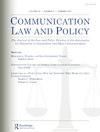Scandalizing the Court in the Commonwealth in the Twenty-First Century
IF 0.2
Q4 LAW
引用次数: 0
Abstract
In 2014, the highest court of appeals for Mauritius overturned the conviction of a journalist for scandalizing the court in an article that was sharply critical of that country’s chief justice. In 2020, a well-known attorney was convicted of scandalizing the court in India for tweets that were critical of that country’s chief justice. While in Victoria, Australia, three government ministers narrowly escaped charges of scandalizing the court by apologizing for criticisms made of a high court judge’s sentence in a terrorist case. “Scandalizing the court,” otherwise referred to as “murmuring against judges,” has been defined as “conduct which denigrates judges of the court so as to undermine public confidence in the administration of justice.” This article explores the action of scandalizing the court in three commonwealth countries. The three relatively recent cases are juxtaposed in order to provide the basis for the argument that these actions are not only ineffective in ensuring respect for the court or ensuring public confidence in the administration of justice, but also fly in the face of other important constitutional issues such as freedom of the press and the constitutional right to a fair trial. The action for scandalizing the court should be abolished in the commonwealth.21世纪的英联邦法院丑闻
2014年,毛里求斯最高上诉法院推翻了一名记者因在一篇尖锐批评该国首席大法官的文章中诽谤法院而被定罪的判决。2020年,一位知名律师因在推特上批评印度首席大法官而被判诽谤印度法院。在澳大利亚维多利亚州期间,三名政府部长为对一名高等法院法官在一起恐怖案件中的判决提出的批评道歉,侥幸逃脱了诽谤法庭的指控。“诽谤法院”,也被称为“诋毁法官”,被定义为“诋毁法院法官,以破坏公众对司法的信心的行为”。本文探讨了三个英联邦国家诽谤法院的行为。将这三个相对较新的案件并列在一起,以便为以下论点提供依据:这些行动不仅在确保尊重法院或确保公众对司法的信心方面无效,而且还与新闻自由和宪法规定的公平审判权等其他重要宪法问题背道而驰。诽谤法院的行为在英联邦应该被废除。
本文章由计算机程序翻译,如有差异,请以英文原文为准。
求助全文
约1分钟内获得全文
求助全文
来源期刊
CiteScore
0.60
自引率
33.30%
发文量
7
期刊介绍:
The societal, cultural, economic and political dimensions of communication, including the freedoms of speech and press, are undergoing dramatic global changes. The convergence of the mass media, telecommunications, and computers has raised important questions reflected in analyses of modern communication law, policy, and regulation. Serving as a forum for discussions of these continuing and emerging questions, Communication Law and Policy considers traditional and contemporary problems of freedom of expression and dissemination, including theoretical, conceptual and methodological issues inherent in the special conditions presented by new media and information technologies.

 求助内容:
求助内容: 应助结果提醒方式:
应助结果提醒方式:


